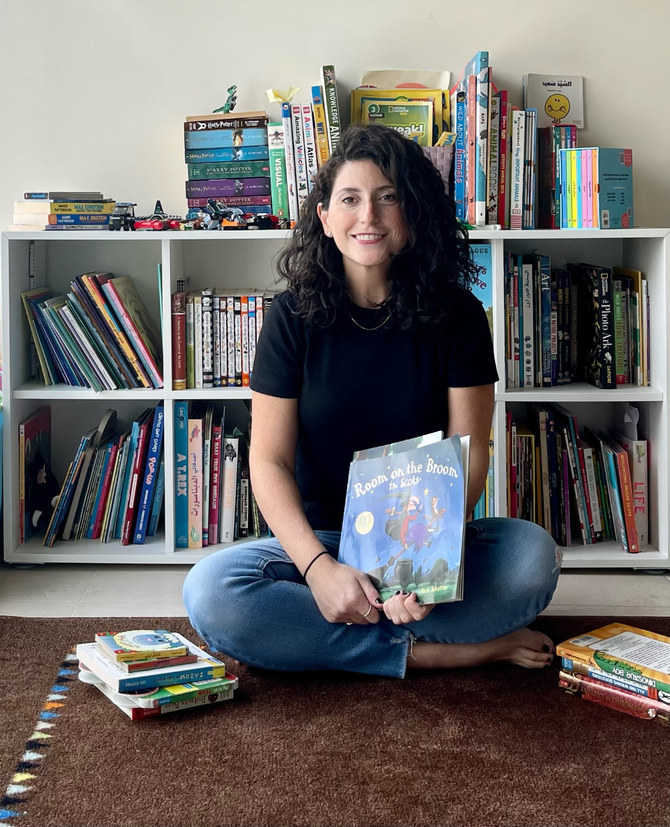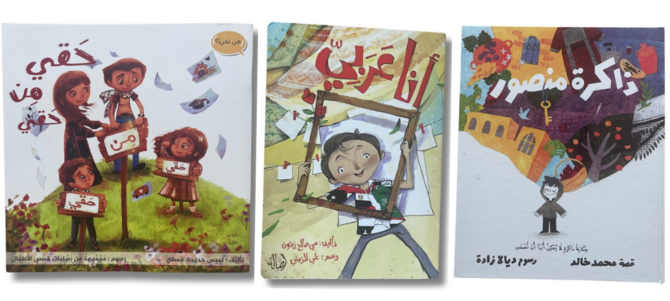DUBAI: Exactly 50 years ago, the General Assembly of the United Nations declared that it would adopt Arabic as its sixth official language. Thirty nine years later, in 2012, the UN Educational, Scientific and Cultural Organization established established World Arabic Language Day on the anniversary of the world body’s adoption of Arabic.
“It is one of the most widely spoken languages in the world, used daily by more than 400 million people,” UNESCO’s website states. And yet, Arabic — a millennia-old language with a wealth of written works encompassing poetry, literature, law, science and philosophy — is sadly on the decline as a written and oral language, according to some experts.
Among those who hold that belief is Syrian educational consultant and children’s book author Nahla Al-Malki. Through her self-titled Instagram page, Al-Malki aspires to motivate the younger generation of Arab children to read and speak in their mother tongue.

In some of her videos, Al-Malki discusses the misconceptions of teaching Arabic, accessing high-quality Arabic children’s books, and the joy of reading. (Supplied)
“Arabic is beautiful and eloquent. Arabic is identity and heritage. I think it’s a very important part of my identity, and more than anything, I want to make sure that my children and other children in the world feel like they are connected to that identity,” she told Arab News from Dubai, where she lives with her husband and two children.
Al-Malki was born and raised in Jeddah, where she was able to stay in touch with her mother tongue by communicating in Arabic all through the 1990s.
“Saudi Arabia is different from other places,” she said. “It still maintains that homely, cosy environment among families and community social life.
“Actually, if we’re going to link it back to language, I think that really helped me flourish. I went to Arabic schools, so the people around me were all speaking Arabic. Of course, my family at home spoke Arabic all the time. With my friends and social circle, everything was in Arabic.”
Al-Malki said she comes from a family that appreciates languages, noting that her brothers speak three languages: Italian, German and French.

Syrian educational consultant and children’s book author Nahla Al-Malki. (Supplied)
After living in Saudi Arabia, Al-Malki pursued her higher studies in Beirut, going on to obtain her English language teaching master’s degree from the University of Manchester and the University of Cambridge.
Her role as an educational consultant includes training teachers, carrying out inspections and audits at universities, and writing course books.
About seven years after she settled down in Dubai, a cosmopolitan melting pot of languages and cultures, she started noticing that her own four-year-old was moving away from speaking Arabic.
FASTFACTS
400m+ Arabic speakers worldwide.
5th Arabic is the fifth most spoken language in the world.
0.6% Share of all online content is in Arabic.
“We did end up putting my son in a British curriculum school. Suddenly, there was a huge shift. It was easier and more comfortable for him speaking English. You fall in that trap as a parent and think, ‘I’m going to speak to them in English.’ But, it didn’t feel right,” Al-Malki said.
“I enjoyed so much reading books with my children. We used to get stuck on certain characters and lines and keep repeating them throughout the day. And sadly, it was all in English.”
This eye-opening personal experience of hers was a key motivation for Al-Malki to help fellow struggling parents through social media. “I wanted to spread hope,” she said.
Since September 2023, Al-Malki has been uploading brief yet structured and useful videos guiding parents, as well as Arab-language enthusiasts, to instill a love of reading and speaking in Arabic.

Book author and educator Nahla Al-Malki says the way Arabic is being taught in the classroom requires a facelift, introducing innovation, fun, creativity — in other words, a modern mindset. (Shutterstock)
“I did not want to give them practical tips, but practical philosophies, in a non-preachy and non-guilt-inducing way, that they can follow as a lifestyle,” she said.
In some of her videos, she discusses the misconceptions of teaching Arabic, accessing high-quality Arabic children’s books, and the joy of reading.
There are several reasons why Al-Malki believes that Arabic is being spoken less on a social level, especially in major Gulf cities that tend to be more expat-heavy than the Levant region.
The real change, she says, should start with places where children spend most of their time: at home and school. The way Arabic is being taught in the classroom requires a facelift, introducing innovation, fun, creativity — in other words, a modern mindset.

Parents have to make it a priority to focus on teaching their children Arabic, says educator Nahla Al-Malki. (Shutterstock)
“I don’t want to put the blame on teachers, because they are very keen and putting (in) so much effort. But there are some basic tools that they still don’t know about,” said Al-Malki.
“They’ve been teaching the Arabic language the same way for over 60-70 years. It’s not wrong for us to question and reflect, because this generation is not the same as the one before, and things are always changing.”
Al-Malki recommends implementing “contextualized learning,” meaning, “bringing the students’ lives into the classroom and thinking about what their interests are. It’s important to read stories in the classroom that are appealing to the students.”
“In an English lesson, they’d be talking about where they traveled last summer or their favorite footballer. But in Arabic, it’s very abstract and dry.” This line of thinking can also be applied, in Al-Malki’s opinion, to children’s story books written in Arabic.

Syrian educational consultant and children’s book author Nahla Al-Malki. (Supplied)
“The main element about children’s books in English is that when you pick them up, you’re enjoying the words, the rhyming, the imagery, the laughter,” she said. “While in Arabic, most of our books are about the moral of the story.
“There are some good books, but the majority still underestimate a child’s ability to imagine and create their own stories and analyze. It’s just not as enjoyable, and I wanted to be part of that change.”
To address this insidious problem, Al-Malki plans to release her first children’s book in 2024, focusing on a central character who goes through different events.
ALSO READ:
• Saving Arabic: Riyadh panel tackles language’s future
• Native Arabic speakers seek to spread language globally
Al-Malki says that, at home, it is crucial for children to converse in Arabic, listen to Arabic music, and watch Arabic cartoons to make sure that Arabic is truly their mother tongue.
“It really starts at home. If I were to summarize everything, it’s all about the parents making it a priority to focus on Arabic,” she said.
“There also needs to be a shift in the mindset of thinking, ‘it’s impossible to speak Arabic.’ Every little bit counts, even if you start reading with them five minutes per day and then increase it as you go; I think it’s very important.”

At home, it is crucial for children to converse in Arabic, listen to Arabic music, and watch Arabic cartoons to make sure that Arabic is truly their mother tongue, says educator Nahla Al-Malki. (Shutterstock)
She added: “Just because the majority of movies and books around us are in English, it doesn’t mean that we can’t speak Arabic. If you look at all the other expat communities, like the French, Chinese or German, they are still speaking their language. Why are we the only ones that aren’t?”
There are also some geopolitical factors to consider in this linguistic problem. Because of instability in many countries of the Middle East, large numbers of Arabic-speaking people are migrating, especially to Europe and North America, which can impact how often they get to use their mother tongue and are in tune with their customs.
Al-Malki also points to the class dynamics of maintaining one’s mother tongue. “When you’re speaking English or French with your children, it gives you a level of prestige,” she said.
“You are educated and better than some. It gives the implication that maybe you carry a different passport or nationality. It’s the idea of status and that English or a second language will open up all these horizons for you.”

Whether at home or in school, Arabic should be taught with innovation, fun, and creativity, says educator Nahla Al-Malki. (Shutterstock)
Despite the hurdles, there is hope. Al-Malki says that her videos are well-received by followers, some of whom are not even from the Arab world. She hopes to one day establish a larger platform that gives the community more tangible tools on how to support their children.
She also feels that some changes are starting to happen, thanks to initiatives launched in the Arab world’s publishing and design fields that seek to preserve the beauty of the Arabic language.
“When you speak Arabic, you adopt a different body language. You speak differently, stand up differently. You use different expressions. So, when we’re losing that, we’re losing the culture, the jokes, the music, the traditions,” said Al-Malki.
“There is a generation of people, parents, educators right now that are waking up to this issue and realizing that language is such an important part of identity.”


















